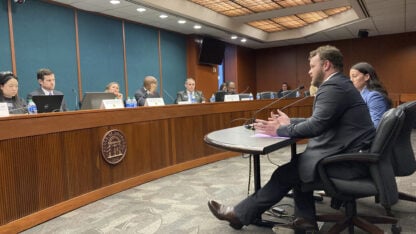Georgia lawmakers are pushing bills that would allow sports betting and horse race betting without a state constitutional amendment, arguing that can be legal under the authority of the state lottery.
The House and Senate are taking different approaches, with Watkinsville Republican Rep. Marcus on Monday introducing House Bill 380, which would allow sports betting only. Meanwhile, a Senate committee on Tuesday held a hearing on Senate Bill 57, which would explicitly include horse racing as part of sports gambling. That bill, sponsored by Sen. Billy Hickman, a Statesboro Republican, would also authorize three horse racing tracks with betting statewide.
A committee could vote on the House bill this week, while Senate Economic Development and Tourism Committee Chairman Brandon Beach, an Alpharetta Republican, promises a vote on the Senate bill next week.
Some Georgia lawmakers typically attempt to expand gambling every year in the General Assembly, but none have been successful since voters approved the lottery in 1992. But a sense of inevitability is growing that Georgia will eventually approve some form of sports betting. So far, bets are legally being taken in 34 states, although only some of those allow bets to be placed in person.
Both bills claim their plans would be legal under the state constitution because they would not violate a bar on casinos or pari-mutuel betting.
Former state Supreme Court Justice Harold Melton wrote an opinion for the Metro Atlanta Chamber of Commerce earlier this year backing the view.
“Based on my review of the relevant law, the original public meanings of applicable terms and the historical context of those terms, it is my opinion that sports betting can be legalized as a state-run lottery for educational purposes solely through legislative action,” Melton wrote in an opinion for the chamber.
The business group and Atlanta’s professional sports teams are backing the House bill.
Most horse race betting in the United States is conducted in pari-mutuel pools where participants effectively bet against one another, but the Senate bill envisions fixed odds betting where the horse track or some other company would have to take the risk on the other side of a bet, allowing it to function like other sports bets and also fit under the lottery.
Avoiding a constitutional amendment is key because they need a two-thirds vote in both chambers of the General Assembly to pass, and then a majority of voters in a statewide election. Republicans don’t have a two-thirds supermajority in either chamber and some Republicans refuse to support gambling on moral grounds, necessitating Democratic support. A bill needs only a majority of both chambers and the signature of Republican Gov. Brian Kemp.
Kemp has been signaling a willingness to legalize sports betting. House Speaker Jon Burns, a Newington Republican, has expressed doubts about proceeding on some forms of gambling without a constitutional amendment, while Republican Lt. Gov. Burt Jones supports legalization and says he doesn’t believe an amendment is necessary.
But some lawyers who advise legislators warn that any bill would be vulnerable to legal challenges without a constitutional amendment.
The House bill would grant 16 total sports betting licenses, including to pro sports team, the Masters golf tournament, the Professional Golfers’ Association, the owners of Atlanta Motor Speedway and the Georgia Lottery Corp. itself. Seven licenses would be reserved for betting firms such as DraftKings and FanDuel.
Bets would be limited to those 21 and older and physically present in the state. Licenses would also be issued to operators of coin-operated amusement machines, typically found in convenience stores.
The Senate bill has many similar features when it comes to sports betting. Unlike the House bill, though, it would not allow betting operators to deduct credit for free bets given to gamblers.









